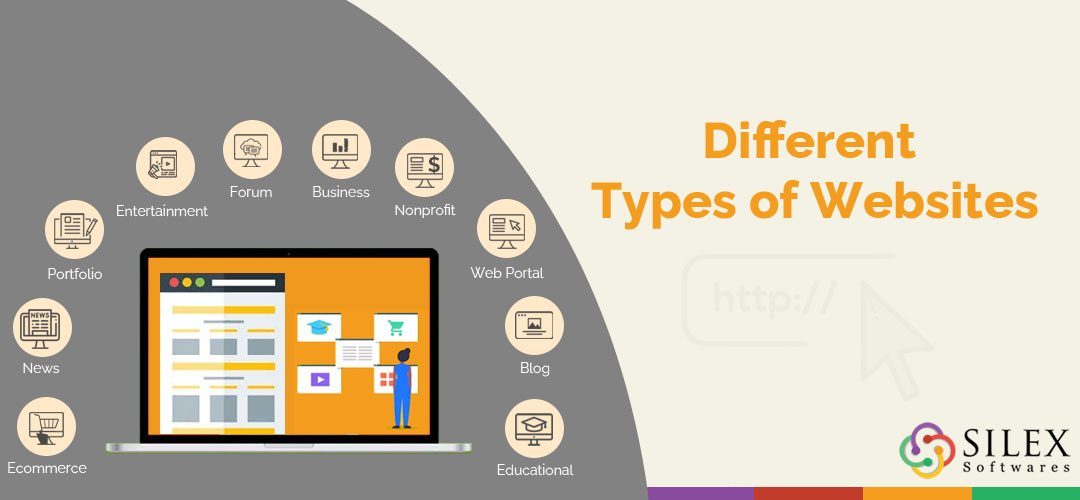Different Types of Websites: Which One’s Right for You?
Today we live in a “digital era,” and there seems to be an overwhelming number of websites on the internet. It’s believed that there are more than 1.98 billion websites now online These websites are as scattered as stars throughout the galaxy – there are too many of them. Formerly, websites were text-based and used by only government organizations or big names to convey information. Today, even the smallest businesses have their websites. Although there are many different websites, we can classify them into ten different types.
1. Business/Corporate Websites

A business website is a company’s digital presence that improves one’s capabilities in doing business. And what sets your business site apart from others is the different sizes and shapes that it has to offer. For example, if you’re in the real estate industry but want to be more successful in your work, having a properly designed website and taking advantage of search engine optimization will help you stand out to your clients. If you have a website, you’re in good shape to succeed; keep your website updated with the latest information on your business.
The content of a business website usually includes descriptions of its products and a way to contact the team or purchase from the website. — some sites are packed full of info, while others provide a simplified experience. It’s all about making sure you have the right amount of pages for your website and doing what best matches your branding.
2.Ecommerce Website

An eCommerce website is a website that sells products or services online. An eCommerce website aims to allow visitors to browse through the company’s products and make purchases online. E-commerce websites are often operated by large and small businesses, supplying products for sale to consumers. E-commerce is made possible through specialized software for handling transactions and other business functions. Many eCommerce platforms offer services to a wide range of businesses: from international companies to mom-and-pop shops.
A few such platforms are:
– BigCommerce
– Shopify
– WooCommerce
3. Blog

In essence, a blog is a type of website that offers information or discussions on particular topics. Like any other website, it provides benefits such as sharing and discussing content with others very quickly, usually through a commenting system. In addition to providing the ability to comment, blogs can offer you many different tools and features, such as search engines, RSS feeds, advertising systems, and much more.
4. Nonprofit/Organization Website

Just like brands and businesses, non-profits and NGOs also require a website. NGOs must also have an online presence to remain relevant and connect with their supporters. A non-profit website is a straightforward way to make a donation to an organization and learn more about them. It will help you decide if they’re the right place for your support.
5. Educational Websites

Educational websites offer various activities and videos to help students learn. These make the work more enjoyable and more accessible for them, to know. Educational websites are of two types- those with the sole aim of educating visitors and those focused on informing others. Some educational websites will also have advertisements that offer products like entertainment and media websites do. One of the essential things for educators is to try to be aware of the media their students are consuming on the internet.
Some of the most popular websites for teens and children to use for education purposes are:
-Khan Academy
-National Geographic Kids
-Brain Pop
-Sesame Street
6. Portfolio Website

Portfolio websites are there to display examples of our past work. Service providers can use portfolio websites to collect the best samples of past work to show potential clients the quality of their work. A portfolio website will make it easier to manage and showcase your work.
A portfolio website is an excellent tool for professional service providers. It’s a place to collect the best examples of past work done so that potential clients can see the quality of their work. These websites are usually designed with a simple and elegant look to not distract from the work itself.
7. Entertainment Website

Entertainment websites are one of the most popular types of websites in the world. They offer content that ranges from music, movies, and TV shows to games, news, and more.
The primary goal of an entertainment website is to provide its users with content that entertains them in some way – whether through music, movies, TV shows, games, or news articles. Hopefully, this will keep people returning to the site repeatedly to continue enjoying their favourite entertainment on demand.
8. News Website

With the development of technology and the rise of digital media, news websites are no longer just a place for journalists to publish their work. They have become a platform where people can share their opinions and discuss current events.
News websites have been in the business for a long time. They are one of the most popular websites that offer content on current events, news, and world affairs.
9. Web Portal

Web portals are a website designed to provide a centralized point of access to various resources. Companies and organizations often use them to provide information about their products or services. They offer a wide range of services in one location, such as search engines, blogs, social media, and email services.
Some examples of web portals are:
– LinkedIn
– Amazon
– Facebook
– Google
10. Forum

A forum is a website where people can post messages and talk to each other in the form of threads.
Forums are sites where people with similar interests can discuss their common topics. It is a site that provides an interactive space for people to share their thoughts and opinions about different subjects, ask questions about specific issues, and engage in conversations with other members.
People who visit forums seek advice on particular topics, want to share their own experiences or knowledge, or want to find out what others think about something.

